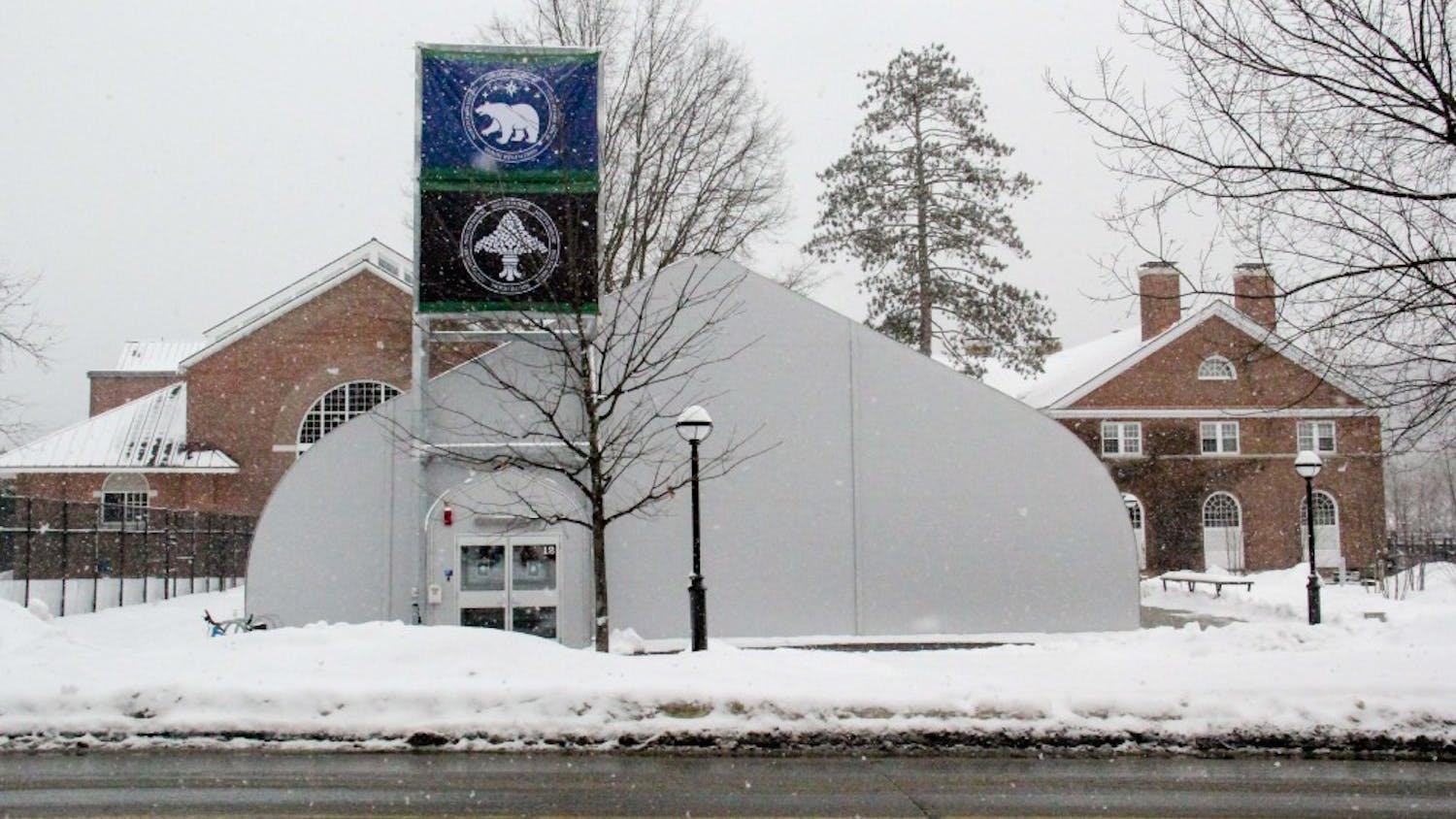This article is featured in the 2020 Freshman special issue.
Twelve terms on. Three terms off. A summer in Hanover.
These are the staples of a Dartmouth experience, as stipulated by the D-Plan, Dartmouth’s version of the quarter system.
Besides the basic requirements, students’ own enrollment patterns — their individual D-Plans — are largely customizable, resulting in quite a bit of coming and going during an academic year. When determining their D-Plans, students normally consider factors like the timing of study abroad programs, their seasonal preferences and the classes required to complete a major. The COVID-19 pandemic has become one more factor to consider, and many students have altered their academic plans to make the most of the situation.
Kemeny’s new deal
In April 1971, Dartmouth faculty members approved a resolution supported by then-College President John Kemeny calling for coeducation at the College by fall of the following year. By November, Dartmouth’s Board of Trustees had voted in favor of both the matriculation of women and the Dartmouth Plan for Year-Round Operation — now more commonly known as the D-Plan — which permitted students to take classes in any season, allowing for a larger student body without needing to build additional housing.
“The big selling point on this was that [the College] would not displace any male applicants in favor of female applicants,” College archivist Peter Carini said. “The idea was that it would free up dorm space so that they would be able to accept any man who applied who would normally get into Dartmouth.”
While Dartmouth had been on a quarter system since 1962, the D-Plan made summer an official quarter, meaning that Dartmouth students could take classes throughout the entire year, according to Carini. In its initial form, a summer in residence was not a requirement, and students in the same class were generally not required to stay together at any point after freshman year, he noted.
Since the D-Plan’s existence was a direct result of coeducation, feelings about the new academic plan were sometimes overshadowed by debates surrounding the decision to welcome women to campus.
Jerry Bowe ’74 recalled that when the D-Plan was instated, the system itself seemed less contentious among students than did the matriculation of women.
“You still had students who came to Dartmouth because it was all male, and those people were opposed to coeducation,” Bowe said. “In my memory, that debate was much more controversial than the actual movement of the classes around into the D-Plan.”
Bunk Rosenblum ’73 said he, too, remembered the intense feelings surrounding coeducation. Despite the presence of naysayers, Rosenblum said that they seemed relatively small in number, noting that overall, students seemed happy that Dartmouth was “getting into the mainstream” by admitting women — and that enthusiasm carried over when thinking about the D-Plan.
“All of it was just plain exciting,” Rosenblum said.
For faculty, the D-Plan itself made waves, as it allowed for new academic opportunities while eliminating others. For example, students’ ability to take off terms at any point in the year precluded faculty members from offering two-term survey courses, according to Carini. These classes tended to cover very broad topics like long periods of history or large collections of literary works, Carini said, and thus, their elimination predominantly impacted humanities departments.
English professor Donald Pease, who joined Dartmouth’s faculty in 1973, noted that while support for coeducation was strong within his department, the D-Plan initially posed unique problems for English professors.
“Faculty in the English department did not think that students should be expected to sacrifice close reading for the sake of efficiency in the running of the campus,” Pease said. “Learning, which required deliberation, is what faculty in the humanities held sacred.”
Pease noted that for other departments, including those in the sciences and social sciences, the D-Plan may have seemed more attractive at its inception given its fast pace and increased flexibility.
For every department, he said, there were certain advantages to the D-Plan, including more time to prepare for different courses that faculty members wanted to introduce.
Opportunities and obstacles
Today, Pease said, professors hold about “as many differing opinions on [the D-Plan] as there are cohorts of faculty.” While some see it as one of Dartmouth’s greatest strengths, others would prefer to revert to a more standard semester or quarter system given that Dartmouth has already established itself as a successful coeducational institution, he said.
Students, too, have differing views on the D-Plan. Though some students love being able to focus on only a few classes at time, others find the fast pace to be jarring. While many students take advantage of the D-Plan’s flexibility to study abroad or get internships in terms other than summer, others find themselves missing their friends when their plans fail to align.
The D-Plan’s issue of social fragmentation has existed from the beginning, according to Rosenblum. He noted that once the D-Plan was implemented, the “coming and going” began, with students taking off terms at various points throughout the year and only some staying in Hanover through the summer. He said that in the earlier years of the system, the time spent apart from friends was an even greater disruption than it may be now, as students then lacked communication methods like texting, video chat and social media.
In 1982, the sophomore summer requirement was implemented, and other guidelines, including mandatory enrollment during senior year, were created to promote class unity, according to Carini. More recently, the College created the undergraduate house communities in an attempt to promote a sense of community and continuity for undergraduate students.
Still, Halla Hafermann ’22 noted that she finds being apart from friends to be the most difficult part of the D-Plan.
“[On off terms], it is really hard to still keep that feeling of the Dartmouth community, like you actually are surrounded by a group of people who you care about and vice versa,” she said.
Although missing friends can be challenging, some Dartmouth students find that the opportunities that the D-Plan provides are worth these scheduling complications. Because students are required to take classes during their sophomore summers, most are left with an extra off term that can be taken at some point during sophomore or junior year. This term allows students to work, research, travel or prepare for graduate school while students at most other schools are enrolled in classes.
Bowe said that this flexibility has long been a perk of the D-Plan, noting that as a student, he stayed on for a summer to take classes in order to get an internship at a New Hampshire nonprofit during his senior spring.
Today, students continue to take advantage of the opportunities provided both by their off terms and by the range of Dartmouth study abroad programs offered in each quarter. Hafermann said that she was able to study abroad in Argentina during her sophomore winter, and she is looking forward to using her off terms to explore different professional options.
Rosenblum noted that another of the D-Plan’s strengths is the quick thinking that its fast pace inspires in students. With just 10 weeks in each term, students must dive into material quickly and work hard not to fall behind, something Rosenblum said is valuable from the perspective of alumni and employers.
“You hire Dartmouth people in part because they’ll roll up their sleeves and get it done. … They’re people who will dig in and have a fast start,” he said. “I think some of that came from the short terms.”
Bryce Lucas ’23 said that he has seen both positive and negative impacts of Dartmouth’s 10-week terms. He noted that the short timeframe keeps course material fresh and interesting, and it provides a different pace from what he experienced in high school.
“By the end of the 10 weeks, you're tired of the workload, but you're not tired of the class,” Lucas said, adding that he thought burnout on both fronts — the workload and the material — might be more common with a semester system.
Still, Lucas said, the D-Plan’s short terms tend to put a lot of stress on students to stay caught up.
Flexibility amid crisis
On June 29, after the completion of a remote spring term and at the beginning of a remote summer term, College President Phil Hanlon and Provost Joseph Helble cited the ingenuity of the D-Plan as an indication that Dartmouth could handle the challenges posed by COVID-19.
“When we transitioned to coeducation in 1972, President John Kemeny had to determine how to accommodate more students without adding beds,” Hanlon and Helble wrote in an email to campus. “... Now we face the challenge of determining how to accommodate the same number of students with what are, in effect, fewer available beds and classroom space. Today’s situation calls for a new D-Plan.”
This “new D-Plan” lies in Dartmouth’s reopening plan for the 2020-2021 academic year. While the enrollment requirements — including the summer residency requirement — have remained in place, most undergraduates will have the chance to spend only two terms on campus over the next four terms.
The situation, along with the reality of remote learning both on and off campus, has caused many students to reconsider their D-Plans, changing the timing of their off terms or even taking gap years.
After taking remote classes during the spring term, Hafermann said that she decided not to enroll in classes during her sophomore summer and eventually chose to take an entire year off of school. She noted that before making her decision, she talked with friends and others who planned to take gap years and decided she would rather do that than “spend a year online and kind of in limbo.”
“There’s just so much that you get from being on campus, being in that environment,” Hafermann said. “Even if I did go back right now, it just would not be the same in any way, shape or form. Social groups and activities are some of my favorite things about campus, and I have a really hard time seeing how that would be able to exist at all.”
She noted that she did consider only taking the fall term off, moving the placement of her leave term in her D-Plan, but elected a gap year instead given the general uncertainty created by the pandemic. She highlighted the flexibility of the D-Plan, which has allowed Dartmouth students more options than students at other schools may have during the pandemic.
“I think that the D-Plan is really cool in that you do have opportunities to swap different terms around,” she said.
Lucas also said that he is hoping to avoid remote learning and campus during the worst of the pandemic. As such, he said that he will be taking the upcoming term off, making his leave term his sophomore fall instead of his junior winter like he had originally intended.
Lucas said that he hadn’t enjoyed remote learning in the spring and as a result tried to avoid it for fall, considering the cost of tuition and the logistics of getting to Hanover in addition to the reduced educational quality. He noted that he had been approved to be on campus for fall, but decided against it. Nearly 98 percent of fall classes, excluding individualized study courses, will be conducted remotely, regardless of whether students are on campus or off.
“I don’t think it’s worth it to learn online,” Lucas said. “It’s just not the same experience, and it’s not the same learning.”
During his leave term this fall, Lucas will be continuing his summer job, he said. He noted that he has not yet made a decision about the winter term but will do so once Dartmouth provides more information about the term’s operation.
While many students, like Hafermann and Lucas, have opted to take leave terms during the pandemic, Sarah Polowczak ’23 has taken the opposite approach. After taking classes remotely during the spring, she decided to enroll remotely for both the summer and the fall, taking classes instead of an off term with the knowledge that most internships would be remote anyway.
“I’m trying to get as many classes out of the way as I can now, during the pandemic, because that’s really all the productive work I can do because I don’t really want to do a remote internship,” Polowczak said.
She noted that her general plan is to “swap” the time that she would’ve been taking classes later in her Dartmouth career with the time that she had planned to be off now, which will allow her to progress through her degree during the pandemic and free up time for internships during her junior year once it is possible to work in person again.
Polowczak said that she hopes to get two or three internships during her junior year but is also considering graduating early if possible and moving onto a master’s degree after three years.
Pease noted that despite the difficult situation Dartmouth students are facing, he is confident that they will find ways to make the most of what they have been dealt. He cited examples he has already seen of students taking previously impossible course combinations using asynchronous options or rethinking their major and minor plans.
“I know Dartmouth students are able to figure ways through what students at other institutions would consider impassible labyrinths,” Pease said. “I’m always amazed at the creative solutions that Dartmouth students come up with for such problems.”
Eileen (Eily) Brady is a '21 from Chicago who studies government and romance languages. Eily loves travel, politics, iced tea and her dogs, Mac and Charlie. She is thrilled to be reporting the news for The Dartmouth.




